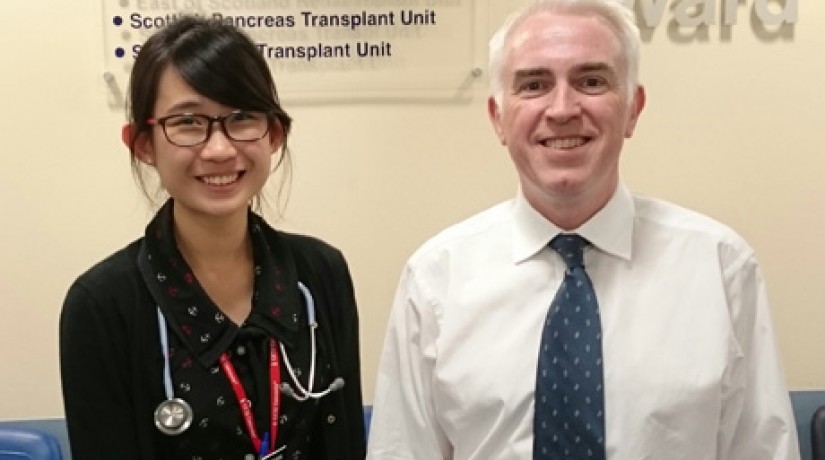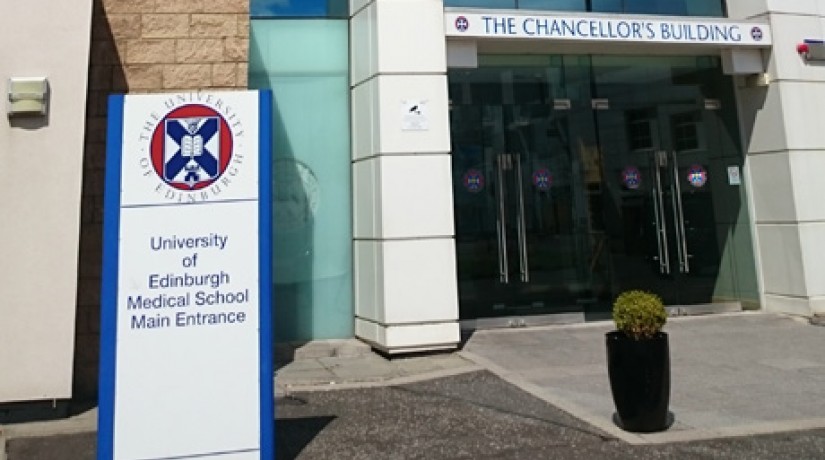Sat
15 OctElective Posting at the Royal Infirmary of Edinburgh By Alisa Kung Kim Ai (Doctor of Medicine)
The Royal Infirmary of Edinburgh was established in 1729. It is the oldest voluntary hospital in Scotland. With a 24-hour accident and emergency department, it provides a full range of medical and surgical services for patients from across the south east of Scotland and beyond.
UCSI University gave us the opportunity to choose where we would like to go for our elective posting, so I chose the Royal Infirmary of Edinburgh because I was interested in transplant surgery. The Royal Infirmary has been performing transplants since the 1960s. In fact, the first kidney transplant in the UK was accomplished in this hospital. Currently, the hospital performs kidney, liver, pancreas and islet cell transplants. As we do not have a placement in transplant surgery during our clinical years in Malaysia, I saw this as an opportunity to acquire more knowledge and experience in this department.
I applied for this elective posting through the University of Edinburgh. The Royal Infirmary has been a teaching hospital for the University of Edinburgh medical school for many years. Once my application was confirmed, the University arranged for my four-week attachment in the transplant surgery department under transplant surgeon, Dr John Casey. Elective students are expected to attend ward rounds, clinic sessions, attend meetings and observe procedures in the operating theatre. I had to plan my own timetable as most of these sessions overlap daily.
Ward Rounds
The transplant surgery department is divided into two teams: renal and liver transplant. The renal transplant team usually has their ward rounds in the morning starting at 8.00am and the liver transplant team in the afternoon at 2.00pm. Ward rounds start in a room with the whole team present. The team typically includes the consultant surgeon, consultant physician, registrar, junior doctor, nurse in charge, pharmacist, transplant coordinator, and physiotherapist. After discussing the patients' condition and management plan, the team then visits the patients in the wards, HDU or ICU.
I found this system more efficient than the ward rounds we usually have in Malaysia as the whole team is present to discuss the cases and as the discussion is done prior to seeing the patients, this allows the doctors to communicate effectively with the patients and provide better patient care. As a student, I learned a lot during ward rounds. I learned about the patient's conditions and how to manage them. And when the team visits the patients, the doctors often spend time to explain the condition of the patient to me, provide opportunities to me to examine interesting cases, and involve me in the team as they diagnose complicated cases. Some of the interesting cases I have seen includes patients with polycystic kidneys, primary hyperoxaluria, paracetamol poisoning and many more.
Clinic Sessions
Clinic sessions are divided into liver transplant, kidney transplant, islet cell transplant and live donor clinics. The clinic usually opens at 9.00am and ends by 1.00pm. Students learn how to educate new patients about transplantation, how to obtain consent for transplantation, observe psychiatric evaluation of donors, and manage patients post-transplantation. Doctors at the clinic taught me how to make spot diagnosis just by observing the patients and trained me in performing proper clinical examinations.
Scrubbing in for Surgery
In the operating theatre, students get to observe surgeons remove the organ, prepare the donor organ and transplant the organ. At the Royal Infirmary, the consultant surgeons encourage students to scrub in so that we will have a better view of the surgery proceedings to learn and understand what is being done. Occasionally, I will get the chance to help in suction and wound closure. This was the highlight of the posting for me as I have never seen transplant surgery and Malaysian students rarely get the chance to scrub in. And as transplant surgeries are not always performed during working hours, I also got the chance to experience being on call. Surgeries can be held at 9.00pm till 3.00am the next day, followed by another surgery at 8.00am in the morning.
Conclusion
The choice to serve my elective posting at the Royal Infirmary of Edinburgh was one of the best decisions I have ever made. This attachment has allowed me to improve myself as a whole. In terms of medical knowledge, my initial aim was to learn about transplant surgery and improve my knowledge in nephrology and hepatology. However, I gained much more knowledge than that, as the patients often had various associated diseases such as heart defects, haemophilia, and delirium, just to name a few.
Other than that, I have grown to be more confident. I learned the importance of teamwork among healthcare personnel, I improved my clinical and language skills, I had the chance to meet medical students from all around the world, and it was interesting to experience a different healthcare system.
Also, travelling abroad on my own allowed me to become more independent, to learn a different culture, and most of all enjoy the delicious local delicacies. I must admit that there were many challenges during the application process for this elective posting, but as they say difficult roads often lead to beautiful destinations. All the hard work was worth it.
Alisa Kung Kim Ai is an alumna of SMK USJ 23, Selangor.









